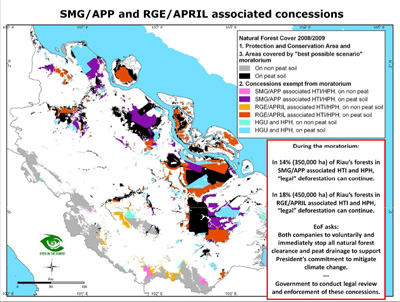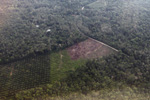Fancy Nancy’s Splendiferous Christmas and other children’s books sold by publisher HarperCollins show traces of rainforest fiber and are therefore linked to deforestation in Indonesia, says the Rainforest Action Network (RAN), an environmental activist group.
RAN commissioned a paper lab to test fiber from several HarperCollins books for the presence of Mixed Tropical Hardwood (MTH), which in the paper business primarily comes from Indonesian forests. The lab found “signifiant quantities” of MTH in Fancy Nancy’s Splendiferous Christmas, a top-selling holiday book authored by Jane O’Connor and illustrated by Robin Preiss Glasser.
RAN said the lab also found “high risk” acacia fiber in other children’s titles, including Splat the Cat: The Perfect Present for Mom and Dad and Talking Pictures: Images and Messages Rescued from the Past. RAN deemed the fiber “high risk” because 90 percent of acacia pulp comes from Indonesia, where two suppliers — Pulp and Paper (APP) and Asia Pacific Resources International (APRIL) — have cleared large tracts of natural forest for acacia plantations. APP and APRIL account for more than 80 percent of Indonesia’s pulp and paper output and are the “main source of both MTH and acacia pulp found in the global marketplace”, according to RAN. Both are the targets of environmental campaigners, including RAN.
 Conversion of peat forest for a plantation. Photo from RAN’s report Turning the Page on Rainforest Destruction: Children’s books and the future of Indonesia’s rainforests.  Concessions held by affiliates of Asia Pulp and Paper (APP) and Asia Pacific Resources International Limited (APRIL) in Riau. Image courtesy of Eyes on the Forest. |
“No child or parent should become an unwitting participant in rainforest destruction this holiday season,” said Robin Averbeck, a Forest Campaigner with Rainforest Action Network, in a statement. “It is past time for HarperCollins to sever ties with Indonesian rainforest destroyers APP and APRIL and join its peers like Scholastic, Hachette, and Disney by adopting a comprehensive global paper policy to keep deforestation, tiger extinction and human rights abuses out of its books.”
RAN notes that while HarperCollins has a paper sourcing statement on its global web site, the policy apparently doesn’t exclude fiber sourced from natural forest conversion. RAN says that HarperCollins-UK does however have a policy that excludes paper from “endangered forest habitats”.
HarperCollins did not respond to request for comment from mongabay.com, but HarperCollins spokeswoman Erin Crum told Environmental Leader that the company “eliminated the use of Indonesian fiber in February” and that “any books printed after that date should be compliant”. She added that HarperCollins does not source directly from APP or APRIL.
Pulp and paper production is one of the biggest drivers of deforestation and peatlands degradation on the Indonesian island of Sumatra. By one estimate, APP and APRIL together cleared 2 million hectares (5 million acres) of forest in Riau Province since the mid-1980s, accounting for half the province’s forest loss during that time. Environmentalists say ongoing clearing by the paper giants puts endangered species like the Sumatran tiger and elephant at greater risk. Up to 1.2 million hectares of standing forest and peatland in Sumatra is still licensed for clearing, according to Eyes on the Forest, a coalition of Indonesian NGOs. Eyes on the Forest estimates that conversion of that area will generate up to 500 million tons of carbon emissions.
Related articles
Indonesia’s pulp and paper targets incompatible with green growth goals

(08/10/2012) Indonesia’s pulp and paper targets incompatible with green growth goals Indonesia’s ambitious targets for boosting pulp and paper production to make it the world’s lowest-cost producer are at odds with its push for green economic growth should expansion proceed on its current business-as-usual path, said a forestry expert presenting at the annual meeting of the Association for Tropical Biology and Conservation (ATBC) in Bonito, Brazil.
War of words between Greenpeace, Asia Pulp & Paper over deforestation allegations

(11/16/2011) Greenpeace and Asia Pulp & Paper (APP), a giant global paper supplier, are locked in a heated battle over the activist group’s allegations that APP products contain fiber sourced from the destruction of forests in Indonesia. At stake is APP’s access to some of the world’s most lucrative markets. Until APP provides solid evidence refuting Greenpeace’s accusation that its pulp and paper production isn’t coming at the expense of natural forests in Indonesia, APP will have a difficult time winning over critics.
Pulp and paper firms urged to save 1.2M ha of forest slated for clearing in Indonesia

(03/17/2011) Indonesian environmental groups launched a urgent plea urging the country’s two largest pulp and paper companies not to clear 800,000 hectares of forest and peatland in their concessions in Sumatra. Eyes on the Forest, a coalition of Indonesian NGOs, released maps showing that Asia Pulp and Paper (APP) and Asia Pacific Resources International Limited (APRIL) control blocks of land representing 31 percent of the remaining forest in the province of Riau, one of Sumatra’s most forested provinces. Much of the forest lies on deep peat, which releases large of amount of carbon when drained and cleared for timber plantations.
Does chopping down rainforests for pulp and paper help alleviate poverty in Indonesia?

(01/13/2011) Over the past several years, Asia Pulp & Paper has engaged in a marketing campaign to represent its operations in Sumatra as socially and environmentally sustainable. APP and its agents maintain that industrial pulp and paper production — as practiced in Sumatra — does not result in deforestation, is carbon neutral, helps protect wildlife, and alleviates poverty. While a series of analyses and reports have shown most of these assertions to be false, the final claim has largely not been contested. But is conversion of lowland rainforests for pulp and paper really in Indonesia’s best economic interest?
Pulp plantations destroying Sumatra’s rainforests

(11/30/2010) Indonesia’s push to become the world’s largest supplier of palm oil and a major pulp and paper exporter has taken a heavy toll on the rainforests and peatlands of Sumatra, reveals a new assessment of the island’s forest cover by WWF. The assessment, based on analysis of satellite imagery, shows Sumatra has lost nearly half of its natural forest cover since 1985. The island’s forests were cleared and converted at a rate of 542,000 hectares, or 2.1 percent, per year. More than 80 percent of forest loss occurred in lowland areas, where the most biodiverse and carbon-dense ecosystems are found.